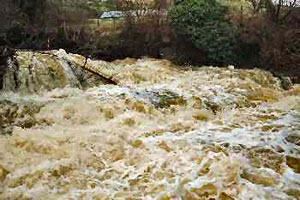Extreme Flows


Floods and droughts occur seasonally, and are an essential part of the annual renewal process. Extremes of either can have a profound effect on a river. An extreme flood leads to huge movements of gravel, displacing and killing invertebrates and washing out fish eggs, and can cause landslips from the surrounding valley. In the medium term the gravel and rocks these floods introduce provide the future homes for the river’s inhabitants. In the short term they can smother and kill all life in a tributary.
Extreme droughts can be even more damaging. High water temperatures and low oxygen levels stress all life and in extremis, the river can dry up killing everything that lives there. In time, the streams recover but recent changes to the way we manage the land, combined with the effects of climate change, have meant that the damage from these extreme events is increasing. More intense rainfall throughout the year leads to an increase in flooding while the extended hot dry periods of the summer mean that 6 of the worst droughts in the last century have occurred in the last 15 years. 1976 remains the worst on record for the Wye. A combination of low flows and the deoxygenating effects of dying ranunculus caused a massive fish kill in June that year.
It is very easy to blame the climate but the way in which we have managed the river catchments has made our rivers more vulnerable to these events. Water now runs off faster, leading to higher flood peaks but lower recharge rates to the natural aquifers. In summer droughts, when the natural base flows from the aquifer should support the life in the streams, these flows are weaker and run out more quickly. We could do something about this by increasing the permeability of catchments through managing our land sympathetically.
Yet summer is the period of greatest demand for water. In theory, better water management, including better control of abstraction, provides at least part of the solution. However, no plan can ever succeed against unlimited demand and ineffective abstraction management.
